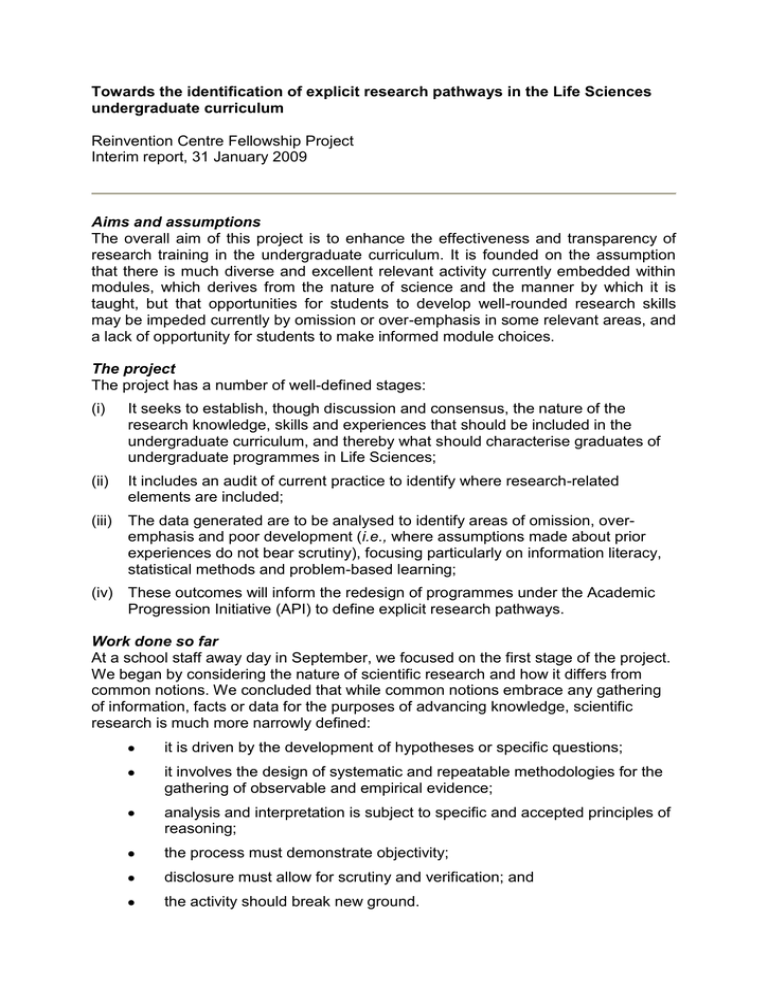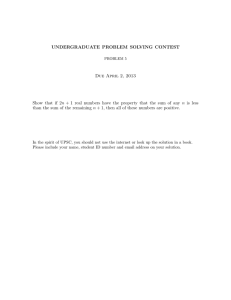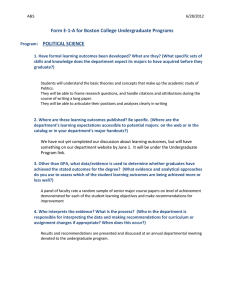Towards the identification of explicit research pathways in the Life... undergraduate curriculum
advertisement

Towards the identification of explicit research pathways in the Life Sciences undergraduate curriculum Reinvention Centre Fellowship Project Interim report, 31 January 2009 Aims and assumptions The overall aim of this project is to enhance the effectiveness and transparency of research training in the undergraduate curriculum. It is founded on the assumption that there is much diverse and excellent relevant activity currently embedded within modules, which derives from the nature of science and the manner by which it is taught, but that opportunities for students to develop well-rounded research skills may be impeded currently by omission or over-emphasis in some relevant areas, and a lack of opportunity for students to make informed module choices. The project The project has a number of well-defined stages: (i) It seeks to establish, though discussion and consensus, the nature of the research knowledge, skills and experiences that should be included in the undergraduate curriculum, and thereby what should characterise graduates of undergraduate programmes in Life Sciences; (ii) It includes an audit of current practice to identify where research-related elements are included; (iii) The data generated are to be analysed to identify areas of omission, overemphasis and poor development (i.e., where assumptions made about prior experiences do not bear scrutiny), focusing particularly on information literacy, statistical methods and problem-based learning; (iv) These outcomes will inform the redesign of programmes under the Academic Progression Initiative (API) to define explicit research pathways. Work done so far At a school staff away day in September, we focused on the first stage of the project. We began by considering the nature of scientific research and how it differs from common notions. We concluded that while common notions embrace any gathering of information, facts or data for the purposes of advancing knowledge, scientific research is much more narrowly defined: it is driven by the development of hypotheses or specific questions; it involves the design of systematic and repeatable methodologies for the gathering of observable and empirical evidence; analysis and interpretation is subject to specific and accepted principles of reasoning; the process must demonstrate objectivity; disclosure must allow for scrutiny and verification; and the activity should break new ground. In programme-based discussion groups, we then considered what research-related elements should be included in the undergraduate curriculum. While there was some disagreement in terms of emphasis and orientation, particularly when considering the possibly conflicting demands of academic research development and the requirements of accrediting bodies, we managed to agree on the following ‘list’ which could form the basis of a questionnaire for the second stage of the project: Learning about research (theoretical appreciation) The scientific method Learning about past research-led developments in knowledge and understanding (research storylines) Current research issues and controversies Developing fundamental research knowledge and skills Information literacy (literature searching strategies, review and synthesis skills, referencing skills, reference-handling software) Formulating hypotheses Designing experiments, environmental surveys and investigations Designing questionnaires Working with human subjects (ethics, recruitment, confidentiality) How it works: principles of laboratory methods and instrumentation Generic concepts in laboratory instrumentation (e.g., calibration, sensitivity, resolution, interference, noise, limits of detection) Practical skills (laboratory and field methods and techniques) Lab and field safety, COSHH The nature of data (accuracy and precision, data quality control and quality assurance) Mathematical and statistical methods, including data analysis and interpretation Recording, reporting and presenting skills (laboratory and field notebooks, scientific report-writing, oral and poster presentations) Critiquing research Practising research Tutor-designed open-ended research-type activities (other than a standard laboratory or field practical activity) Independent research (e.g., the research project) Between the away day and the end of January, little further progress has been made. However, a job specification for a temporary assistant to conduct the audit (stage ii) is in preparation, and a person should be ‘in-post’ during semester 2. Thereafter the outcomes of the audit will be needed urgently to inform programme redesign under API, which is due to be presented for validation in November. Andrew Rendell




